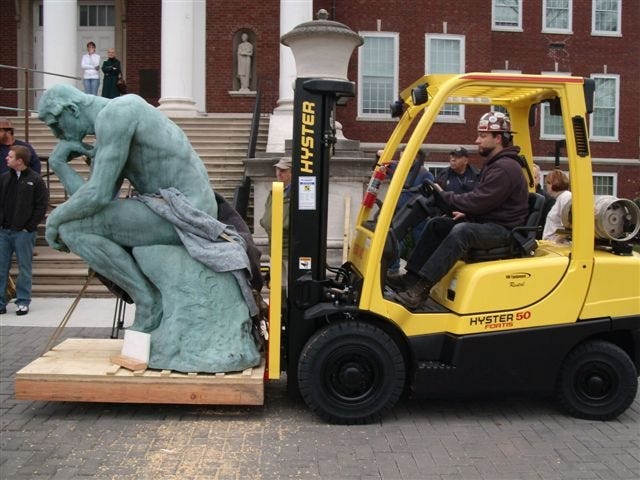Anti-intellectualism, bureaucracy, marketing, and society
This post was provided by Mikhail Grinberg, a strategy consultant, student of the defense industry and member of the Defense Entrepreneurs Forum. The views expressed belong to the author alone.
The Army may have an “anti-intellectual” bias, but the arguments set forth to support this claim are incomplete. Last week, Matthew Cavanaugh laid out a passionate account for why the “profession of arms is decaying.” Bureaucracy — that gentle giant that is always available to take a beating — was Cavanaugh’s primary culprit. But his article may have had an ulterior motive. Andy Rohrer set out to correct him. He agreed that there is a “strain of anti-intellectualism in the Army.” But for Rohrer, society commits the anti-intellectual crime, bureaucracy is only a culprit.
These issues cannot be taken lightly. Anti-intellectualism — which neither author defines well — is a serious issue and a heavy accusation. More importantly the causes they cite for it are perhaps more frightening than the problem itself. Their assertion may be true, but it requires much more analysis to confirm.
Cavanaugh and Rohrer define anti-intellectualism in the margins, leaving the reader wanting of what — exactly — is there a bias against. Thus, this rebuttal tries to understand step-by-step the arguments the two authors make, while offering commentary on why their conclusions may need further research.
Cavanaugh believes that military judgement — the ability to exercise “high moral content” repeatedly — is decaying due to a disregard for intellect. This disregard is evident at West Point, he says, where cadets are lectured on professionalism but “practice bureaucracy.” Cavanaugh quotes a colleague that argues that at West Point a culture of discussion, debate, and continued innovation has been replaced by a codified, restrictive bureaucracy.
Cavanaugh’s argument is supported by anecdotes: cadets wearing reflective exercise belts indoors, hurdles of foreign travel, and one officer’s conviction that there is no place for “second lieutenant strategic thinkers.” The latter could raise eyebrows, but considering the trivial nature of other examples, an analytical void remains.
He then offers a “second opinion,” which quotes one former Marine Commandant’s belief that there are “too many intellectuals” among the military brass and another Army “four star” taking pride in reading his in-box, but nothing else. This is concerning, of course, but he never cites Gen. McChrystal’s call to listen and learn before leading or Gen. Mattis’ emphasis on the importance of reading “especially in our line of work where the consequences of incompetence are so final for young men.” “Thanks to my reading” Mattis famously went on, “I have never been caught flat-footed by any situation, never at a loss for how any problem has been addressed (successfully or unsuccessfully) before.”
These two examples are also anecdotal, but that’s the point. You cannot get annoyed at travel forms, officers on a high horse, or even Generals that take pride in reading only their in-box and draw conclusions — especially such broad and accusatory ones as anti-intellectualism. There are just as many counter-examples.
Cavanaugh goes on with hard-to-follow logic. Anti-intellectual bias is everywhere, he says. For example, people spend more time watching television shows about cooking today than they do cooking. And they spend 50 percent less time cooking than they did in 1960. He fails to mention that microwaves didn’t exist, neither did cable, and many women were still confined to the home allotting more average family time to cooking in 1960 than you would find today.
He applies this formula to the military. Apparently too many people watch war movies, but not enough engage in any “serious discussion on the use of force in the real world.” Baffling. Considering we spent the last 13 years at war and have generated volumes of literature on the use of force post 1960 (his reference year) — not to mention untold volumes of Iraq and Afghanistan material which has and will continue to come out — his logic is difficult to defend.
His next argument indicts bureaucracy for a crime against intellectualism. Apparently “bureaucracies are easy to control because they remove individual judgement. As such they cannot produce knowledge.” But the military awards great honors to those that exercise individual judgment say — in the extreme — by throwing themselves on a grenade to save others. And universities, the best of bureaucracies, produce ample knowledge. As did Bell Labs or IBM, both organizations with ample bureaucracy.
Finally, Cavanaugh draws the last straw, and suggests that we have an Army that rejects critical — or seminal — thinkers. The type of soldiers needed to be innovative and to provide “intellectual self-renewal” to an organization that is tasked with winning wars. He eludes that this anti-intellectualism may have been what happened in Iraq. We made mistakes in Iraq (an understatement of the decade), but there is no clear evidence of endemic, decaying anti-intellectualism in the military. In fact, after many-a-blunder didn’t smart leaders come in? Weren’t captains and colonels making endless small-unit decision that were not only brave, but innovative? We went from a military prepared to fight at the brigade level, to having quite independent platoons and squads operating in urban terrain.
Does that not take intellectually-driven and innovative leadership?
Upon concluding Cavanaugh’s piece, which was published in a national magazine’s blog (perhaps most upsetting), the true purpose of his essay is revealed: marketing, albeit for a great cause. I’ll give him that. He reveals that he and other colleagues have set out to cure the Army — or at least West Point — of its “anti-intellectualism” with the WarCouncil, a new forum “dedicated to studying the use of force.”
 There may be anti-intellectual bias in the Army, but there is no proof of it in Cavanaugh’s piece. This is where Rohrer enters, adding more nuance, but falling short. His argument does not prove the existence or prevalence of anti-intellectualism, it simply shifts blame.
There may be anti-intellectual bias in the Army, but there is no proof of it in Cavanaugh’s piece. This is where Rohrer enters, adding more nuance, but falling short. His argument does not prove the existence or prevalence of anti-intellectualism, it simply shifts blame.
Bureaucracies don’t kill intellectuals, people do
Rohrer begins his piece by conceding that “there is anti-intellectualism in the Army.” But he believes that its people — the soldiers that comprise the Army — “bear part of the blame” and that bureaucracy simply perpetuates or amplifies the problem.
There is meat to his argument, if you believe Rohrer’s first premise (and this author does), which quotes Gen. Abrams: “Soldiers are not in the Army. Soldiers are the Army.” And so, one cannot lay sole blame on the institution for the folly of its personnel. If soldiers are the institution they too carry a responsibility for an Army facing intellectual malaise.
It takes Rohrer several more paragraphs to get to his point — that society at large may be to blame — but we should follow his logic there.
Rohrer too cites Cavanaugh’s trivial examples of bureaucratic roadblocks, but suggests they differ in scale. Enforcing uniform regulations — even reflective belts indoors — falls more in line with a military culture of “sadism thinly disguised as necessary discipline” while having someone fill out multiple forms and visit a doctor in order to travel abroad is a reflection of the military bureaucracy’s aversion to risk. It’s a systemic survival mechanism; proper paperwork can protect the institution from unexpected circumstance. Rohrer rightly criticizes Cavanaugh’s examples as barely illustrative. “Neither rises to the level of a bureaucratic maneuver that stifles or interferes with intellectualism,” he says.
In fact, Rohrer points out that bureaucracies enact rules, they seldom create them. For example, the current promotion system was enacted by Congress in 1980 by the Defense Officer Promotion Management Act (DOPMA). This law spelled out how officers are promoted; it has been thoroughly followed since. Thus, after 34 years, everyone in leadership got there via the current system. As Rohrer underscores, criticizing the effectiveness of the bureaucracy is a judgment on the quality of leadership. It is then risky to do so.
Under this current system, which is risky to criticize, says Rohrer, it is very challenging for Army officers to follow intellectual pursuits. Most interesting courses take up too much time or detract from opportunities that are mandatory for promotion. Thus, officers, often skip alternative development paths because they are too afraid to miss their promotion dates.
Rohrer suggests that officers avoiding alternative development, intellectualism-inducing, paths is a myth. After all they are trained risk takers. So there must be something else. (I am accepting this point, but take issue: a willingness to risk for your country or your fellow soldier is different than taking career risks.)
“Despite a bureaucratic system of promotion,” he goes on “…choice is inherently human… It would be foolish to think that risk aversion is the determinant factor in a person’s [officer’s] anti-intellectualism.” Rohrer encourages readers to accept Gen. Abrams adage and make the following leap: that soldiers are representative of our society and thus anti-intellectualism comes to the Army from the outside. “If there is indeed a cultural bias toward anti-intellectualism, then it stands to reason that the soldiers, the officers, who are the United States Army, are themselves anti-intellectual as a group.”
Again, this may be true. But to prove this point, Rohrer steals from Cavanaugh’s script, and relies on one study from the 1960s that assessed anti-intellectualism in America. And found us to have such sentiments. One study! From 50 years ago. He concludes by reminding us that we, however, should not forget about the bureaucracy. It is complicit in the crime, he says. Taking Army officers and “perpetuating” their anti-intellectual “predisposition.”
Innocent before proven guilty
There may be anti-intellectualism in the Army, but neither Cavanaugh or Rohrer provide enough evidence to draw meaningful conclusions. The former blames bureaucracy and attempts to scare us into reading a new forum, while the latter leaps to a rather incurable explanation to a problem we may not have. Neither offer a solution.
The fact that they are writing about this at all, however, suggests an existing sentiment. It should be properly analyzed. Defining what anti-intellectualism is would be a good start.


No comments:
Post a Comment